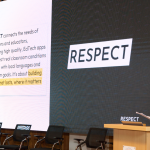December 12, 2024
Welcome to day twelve of the 2024 Appvent calendar where today we will focus on Panjaya.

We are really excited about today’s tool as it has the potential to make learning materials more accessible for students.
Panjaya is a video language translation platform that applies Ai to perform audio translation, voice cloning, and lip-syncing.
Whilst Panjaya is currently in private alpha, you can still join a waitlist to gain access at some point in the future.

AI tool of the day: Panjaya
We now live and work in an increasingly global world and for a variety of reasons, students often arrive in classrooms as non-native speakers. This presents a huge challenge for teachers as students are often left behind or struggle to follow lessons due to the presence of a language barrier. This is where Panjaya has the potential to make a huge difference. Take a look at this quick video which shows Panjaya in action:
TED is well-known in the educational community as a source of inspirational talks and thought leadership. Back in May TED announced they are using Panjaya to deliver AI-adapted multilingual talks which you can read about here.
Educational Benefits:
Accessibility is without doubt the key benefit for educators. Video-based learning resources in any language can be created using Panjaya. This potentially makes it a really powerful tool for anyone who teaches EAL students in the UK and of course, a useful tool for classrooms and educational institutions around the world.
One of the great features of Panjaya is how it maintains authenticity. This is really important for maintaining great teacher-student relationships. The software makes it seem like the teacher can actually speak multiple languages. This is all made possible through BodyTalk, Panjaya’s suite of tools that harmoniously combine voice cloning and lip-syncing. Wow!
The authenticity factor is also important in promoting student engagement. Traditional dubbing can be awkward and often poorly executed which creates a disconnect between teachers and students. Panjaya’s AI-powered tools have solved this problem!
Practical Application:
Panjaya is currently in private alpha as it is being actively developed. You can join a waitlist and if you are lucky enough to gain access here are the three steps that you can follow to create a translated video:

Currently, twenty-nine languages are available though this will most likely increase as the product develops.
Following the initial translation, tools are present to help you modify your speech in terms of rhythm, tone, and pacing.

The final step in the process involves applying the lip sync. These tools use Ai to accurately apply dubbing so that it matches a person’s facial movements and expressions.

Any videos that have been created by Panjaya can be downloaded. Following this, you can then share your videos via your LMS making it easy to distribute content to students.
Considerations and Tips:
Panjaya recently secured $9.5M in seed funding so you can expect to see this product take off in the coming months and undoubtedly new features will be rolled out regularly. It’s great to see that education is listed on their website as one of its primary use cases.
As is the case for all AI tools, teachers are encouraged to check audio translations for bias and accuracy. Teachers should also consult their school’s data protection officer to check compliance if planning to use this tool in an educational setting.
Learn more about Panjaya by visiting their website here or by checking out their blog here.
Stay Ahead with AI in Education:
Follow us on Bluesky (@globaledtech) Twitter/X (@global_edtech), and connect with us on LinkedIn for more innovative ideas and discussions. Interested in reaching a wider audience? Learn about our competitively priced sponsored post opportunities. Don’t forget to follow the insights of Mark Anderson at @ICTEvangelist on Twitter/X, and Ronan McNicholl at @ronanmcnicholl for more expert perspectives on EdTech.








